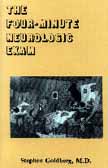
|
The Four-Minute Neurologic Exam by |
This course meets the qualifications for 6 hours of continuing education credit
This
course provides an excellent introduction to the neurology necessary to evaluate
a patient in deciding whether or not to refer to a neurologist. This course
will teach the therapist the basics of a differential diagnosis of a psychological
v. a neurological disorder.
Designed originally for medical doctors to quickly assess for neurological problems, this course is relevant to psychotherapists and nursing professionals, as it provides a "Rapid Neurological Assessment when Time is Limited,"
Learning Objectives:
The Four-Minute Neurologic Exam will allow students to:
*Receive an overview of a brief clinical neurological exam technique; and know which parts of the exam they may do, within the scope of their practice
*Know how to differentiate an organic v. a non-organic illness
*Have a ready reference when they have neurological questions about their patients
*Know when to refer a patient to a physician for a neurological exam
*Please note that while there are parts of the Four Minute Neurologic Exam that are not within the scope of practice of psychotherapy, they are important to know about to make an accurate differential diagnosis and referral.
This course meets the qualifications for 6 hours of continuing education credit

is approved by the:
www.psychceu.com
maintains responsibility for the program.
how it works
Due to the wonders of technology, the minute you submit your order over our secure line, it is encrypted, and processed safely and securely by Authorize.net, a secure web processor. Or, if you prefer, call us toll-free 888-777-3773.
You will immediately receive confirmation of your order, your password and how to access the course material. (Please do not block e-mails from classes@psychceu.com, orders@psychceu.com and info@psychceu.com)
If you ordered an online course, you can begin to take the course immediately.
You will receive instructions, via e-mail, on how to take your test online.
Contact us or call if you need technical support.
Your test will be graded online, so the moment you have passed, you may print out your certificate of completion.
That's it!
You are done!
This course consists of a post-test based upon reading the text. There is no online material to read. After you pass the post-test, you may print out your own certificate.
Stephen Goldberg, MD, is a neuroanatomist, an ophthalmologist and a family physician, making him uniquely qualified to teach Clinical Neuroanatomy. Dr. Goldberg is a Professor Emeritus of Anatomy at the University of Miami School of Medicine. Over 300,00 copies of Clinical Neuroanatomy Made Ridiculously Simple have sold, teaching legions of medical students what they need to know to understand the basics of clinical neuroanatomy.
 1999. 56 pgs., 13 illus. (ISBN #0-940780-05-4 )$12.95 + shipping
|
TABLE OF CONTENTS
1. Principles of Neurologic Localization
2. The History
3. The Neurologic Exam
4. Laboratory Tests
Appendix (The ophthalmoscopic exam)
Glossary
Index
888-777-3773
|
|
All material included in this course is either in the public domain, or used with express permission. |
www.psychceu.com adheres
to the American Psychological Association's
Ethical Principles of Psychologists. Our courses
are carefully screened by our Planning Committee to adhere to
APA standards. We also require authors who compose Internet courses
specifically for us to follow APA ethical standards. |